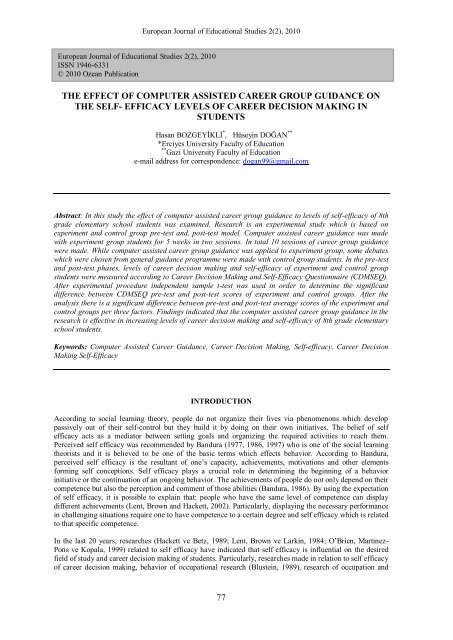Educational - Ozean Publications
Educational - Ozean Publications
Educational - Ozean Publications
Create successful ePaper yourself
Turn your PDF publications into a flip-book with our unique Google optimized e-Paper software.
European Journal of <strong>Educational</strong> Studies 2(2), 2010European Journal of <strong>Educational</strong> Studies 2(2), 2010ISSN 1946-6331© 2010 <strong>Ozean</strong> PublicationTHE EFFECT OF COMPUTER ASSISTED CAREER GROUP GUIDANCE ONTHE SELF- EFFICACY LEVELS OF CAREER DECISION MAKING INSTUDENTSHasan BOZGEYĠKLĠ * , Hüseyin DOĞAN ***Erciyes University Faculty of Education** Gazi University Faculty of Educatione-mail address for correspondence: dogan99@gmail.comAbstract: In this study the effect of computer assisted career group guidance to levels of self-efficacy of 8thgrade elementary school students was examined. Research is an experimental study which is based onexperiment and control group pre-test and, post-test model. Computer assisted career guidance was madewith experiment group students for 5 weeks in two sessions. In total 10 sessions of career group guidancewere made. While computer assisted career group guidance was applied to experiment group, some debateswhich were chosen from general guidance programme were made with control group students. In the pre-testand post-test phases, levels of career decision making and self-efficacy of experiment and control groupstudents were measured according to Career Decision Making and Self-Efficacy Questionnaire (CDMSEQ).After experimental procedure independent sample t-test was used in order to determine the significantdifference between CDMSEQ pre-test and post-test scores of experiment and control groups. After theanalysis there is a significant difference between pre-test and post-test average scores of the experiment andcontrol groups per three factors. Findings indicated that the computer assisted career group guidance in theresearch is effective in increasing levels of career decision making and self-efficacy of 8th grade elementaryschool students.Keywords: Computer Assisted Career Guidance, Career Decision Making, Self-efficacy, Career DecisionMaking Self-EfficacyINTRODUCTIONAccording to social learning theory, people do not organize their lives via phenomenons which developpassively out of their self-control but they build it by doing on their own initiatives. The belief of selfefficacy acts as a mediator between setting goals and organizing the required activities to reach them.Perceived self efficacy was recommended by Bandura (1977, 1986, 1997) who is one of the social learningtheorists and it is believed to be one of the basic terms which effects behavior. According to Bandura,perceived self efficacy is the resultant of one’s capacity, achievements, motivations and other elementsforming self conceptions. Self efficacy plays a crucial role in determining the beginning of a behaviorinitiative or the continuation of an ongoing behavior. The achievements of people do not only depend on theircompetence but also the perception and comment of those abilities (Bandura, 1986). By using the expectationof self efficacy, it is possible to explain that: people who have the same level of competence can displaydifferent achievements (Lent, Brown and Hackett, 2002). Particularly, displaying the necessary performancein challenging situations require one to have competence to a certain degree and self efficacy which is relatedto that specific competence.In the last 20 years, researches (Hackett ve Betz, 1989; Lent, Brown ve Larkin, 1984; O’Brien, Martinez-Pons ve Kopala, 1999) related to self efficacy have indicated that self efficacy is influential on the desiredfield of study and career decision making of students. Particularly, researches made in relation to self efficacyof career decision making, behavior of occupational research (Blustein, 1989), research of occupation and77
















